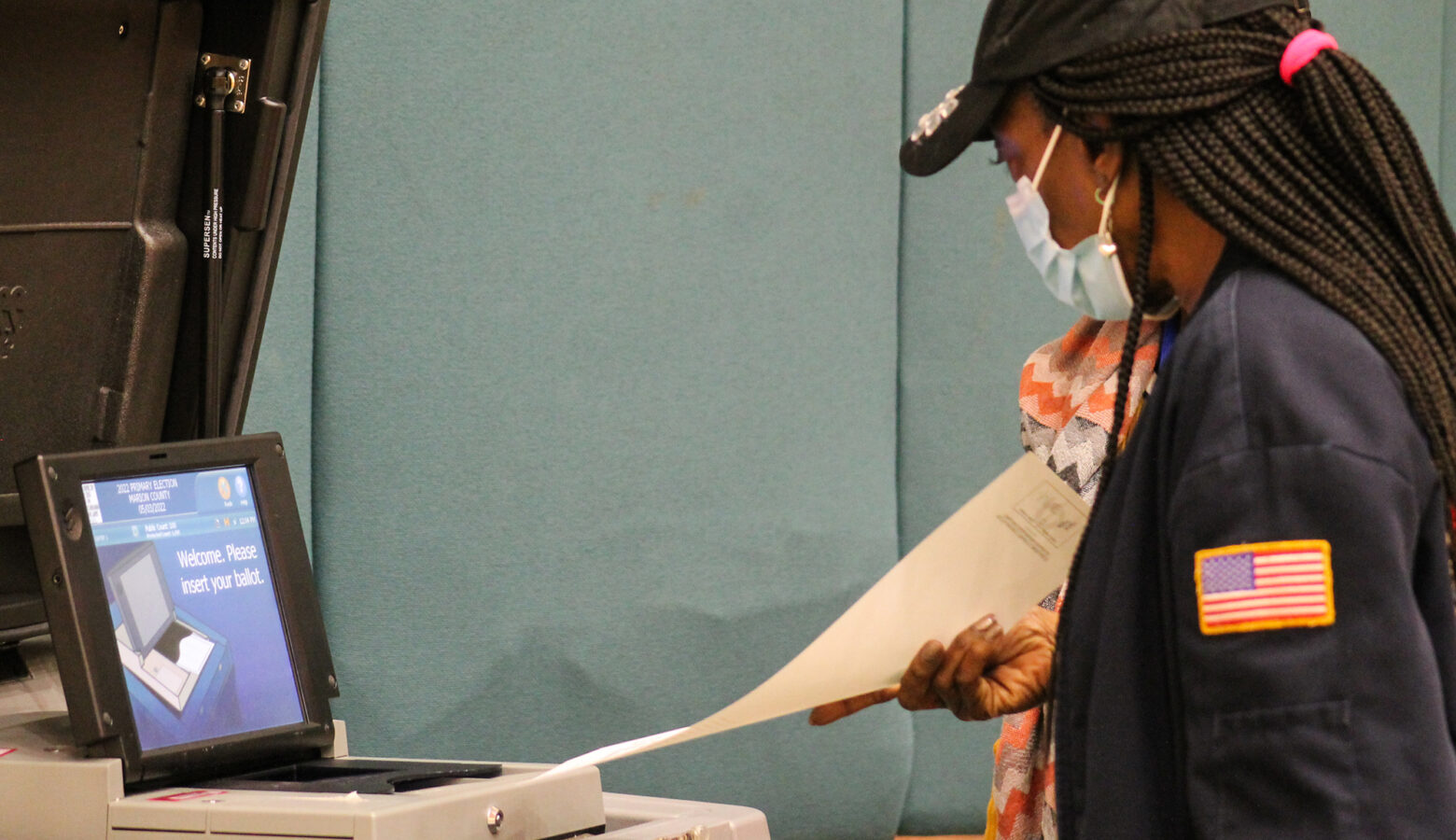
Recent reporting
Elections
These are the most common mistakes election boards see on mail-in ballot applications, at the polls

FILE PHOTO: Steve Burns/WTIU
As elections approach, local officials are urging individuals to be vigilant when filling out ballots and applications for mail-in ballots.
In Indiana, not everyone is eligible for vote-by-mail. They must fall under one of 12 acceptable categories.
Brent Stinson is the deputy director for administration at the Marion County Election Board. He said people sometimes forget to specify why they are requesting to vote by mail.
“People sometimes forget to check one of those boxes,” he said. “And the voter themselves has to check that we can't assume a reason why somebody is applying.”
Elections
Why doesn't Indiana have citizen-led ballot initiatives?

Lauren Chapman/IPB News
Ohio voters said yes to citizen-led ballot initiatives on abortion rights and the legalization of cannabis in November 2023. Why doesn’t Indiana have a similar option? That’s a question our listeners wanted to know. It would require a change to the state constitution, but lawmakers haven’t shown interest.
Indiana is one of 24 states with no mechanism for a citizen-led effort to put an initiative on the ballot.
Randall Shepard, a former chief justice of the Indiana Supreme Court and a senior judge at the Indiana Court of Appeals, wrote a book on the history of Indiana law. He said the state’s larger attitude was that the legislature should be making the decisions – a sentiment expressed at Indiana’s last constitutional convention in 1851.
“One of the members stood up on the floor and said, ‘No, that’s what we’ve been hired to do. We shouldn’t shove this off on our fellow citizens. They’ve got plenty to do,'” Shepard said.
Environment
Have trouble understanding climate trends in Indiana? A climatologist gives their tips

Courtesy of Climate Central
Climate change isn’t playing out everywhere in the same way. That’s because our climate here in Indiana is different from other parts of the country and the world. This can make the data confusing. A member of our audience from Noblesville wanted to better understand it.
Melissa Widhalm is the regional climatologist and associate director at the Midwestern Regional Climate Center at Purdue University. She said scientists often look at the whole globe to get a more reliable picture of climate change because there’s less variation.
“So if I'm talking about Earth's temperature over a year — that's a very stable measurement. You can think of it a lot like our bodies. If we look at it from year to year, it doesn't fluctuate very much. Just like our body temperature really only operates in a small window of temperatures before we feel like we have a fever or we're too cold and we start shivering. That's similar to how the Earth's global temperature is,” Widhalm said.
Of course, many Hoosiers want to know how climate change affects them specifically. After all, hurricanes, wildfires and sea level rise aren’t something we often experience here.
Widhalm said if you want to get a better idea of how climate change is playing out in Indiana, there are some key indicators you might want to watch. She also offered advice on where to find accurate information about them.
Health
What is stopping cannabis legalization in Indiana?

Lauren Chapman/IPB News
Indiana is now surrounded by three states that have legalized recreational cannabis, but attempts to legalize it here haven’t made it far. One lawmaker says personal perceptions are stopping Indiana from joining the 38 other states with some form of legalization.
Republican leaders say cannabis legalization is unlikely this legislative session.
Sen. J.D. Ford (D-Indianapolis) said Hoosiers have been asking lawmakers for cannabis legalization or decriminalization, but some lawmakers are avoiding the issue.
“You've got the elected officials who are unwilling to have the conversation and you've got some of these other powerful lobbying groups that are continuing to block conversation, block bills from getting a committee hearing,” Ford said.
Health
What is gender-affirming care?

Lauren Chapman/IPB News
Lawmakers filed several bills in 2023 to limit or outright ban gender-affirming care for minors in Indiana. But there are a lot of misconceptions about what that type of health care is and isn’t.
Members of the Indiana Two-Way asked us questions about gender-affirming care. To join, text “Indiana” to 73224.
What is gender affirming care?
Gender affirming care is health care that encompasses mental, social, medical and surgical care designed to treat gender dysphoria.
Dr. Sumanas Jordan directs Northwestern’s Gender Pathways program. She explains gender-affirming care is a “really big umbrella” of services.
“That can be anywhere from mental health to medical support to, of course, surgical support – which, it tends to get the most attention,” Jordan said. “But certainly it really encompasses the entire spectrum of health care.”
Housing
How are landlords that operate under nonprofit or charitable status held accountable?

Lauren Chapman/IPB News
Who determines nonprofit status for companies in the state, particularly for apartment complexes? And how are these landlords held accountable? That’s a question our audience wanted to know.
According to several government officials, various state and federal entities make these determinations and work to oversee these companies.
Chase Haller is the section chief of the Homeowner Protection Unit of the Indiana Attorney General’s office.
He said the Indiana Secretary of State approves or denies nonprofit status for Indiana apartments or other companies. For nonprofit tax-exempt companies, or companies with a 501(c)(3) status, the federal Internal Revenue Service must make this designation.
Housing
What rights do renters have when management companies change hands?

Lauren Chapman/IPB News
What rights do renters have when management companies change hands? One listener from La Porte was curious.
Jodi Velasco is a senior attorney at Indiana Legal Services who practices housing law.
She said for residents who still remain in the lease from the old rental company, the provisions in this lease still apply.
Velasco said the renter's rights in this situation should also remain the same.
“The rights and responsibilities of the tenants remain the same,” she said. “And the landlord's obligations to provide a clean, safe, habitable environment as well as not lock the tenant out, things like that, that all remains the same.”
Labor
Why hasn't Indiana raised its minimum wage?

Lauren Chapman/IPB News
Why hasn’t Indiana raised its minimum wage? Several members of our audience inspired this question.
An MIT calculator shows the average living wage for an adult Hoosier with no children is more than $15 an hour.
Andrew Butters is an associate professor at the Indiana University Kelley School of Business. He said employers may oppose increases in minimum wage as this would mean they have to decide how to pass on extra labor costs.
Butters said employers can internalize these costs or pass them onto consumers.
“To the extent that it's more expensive for me to hire the workers to employ in my restaurant or to my grocery chain or for, for that matter, whatever business I'm working in, I might end up then passing those costs on to higher prices that are then going to be ultimately borne by the end consumers,” he said.
State government
Want lawmakers to know how you feel about a bill? Consider speaking at a committee hearing

Lauren Chapman/IPB News
Legislative committees are important. They’re the first time bills are heard and often the only times the public can speak for or against a bill in front of lawmakers that don’t represent them. It’s also where most bills die.
There are a few ways you can engage with committees on topics you care about. You can watch the livestream of legislative committees on the Indiana General Assembly’s website — recordings are usually available a day or two later. Afterward, you might decide to contact members of the committee to let them know your thoughts on a bill.
Andrew Downs is director emeritus of the Mike Downs Center for Indiana Politics at Purdue University Fort Wayne. He said watching these committee hearings is a better way to stay informed rather than just looking at how a lawmaker voted.
State government
Where does Indiana state budget funding come from?

Brandon Smith/IPB News
Indiana’s current two-year state budget includes more than $44 billion in spending. But where does all that money come from? That’s a question our audience wanted to know.
By far the biggest source of state budget funding is state taxes. And Indiana Fiscal Policy Institute President Stephanie Wells said Indiana’s tax system is fairly simple.
“There’s a lot of smaller taxes that we don’t collect here in Indiana — like severance taxes, inheritance taxes and some other things," Wells said.
The state’s three major taxes — sales, individual income and corporate — are projected to make up more than 80 percent of Indiana’s tax revenue in the new budget. And state tax revenue accounts for nearly half of all budget funding.
